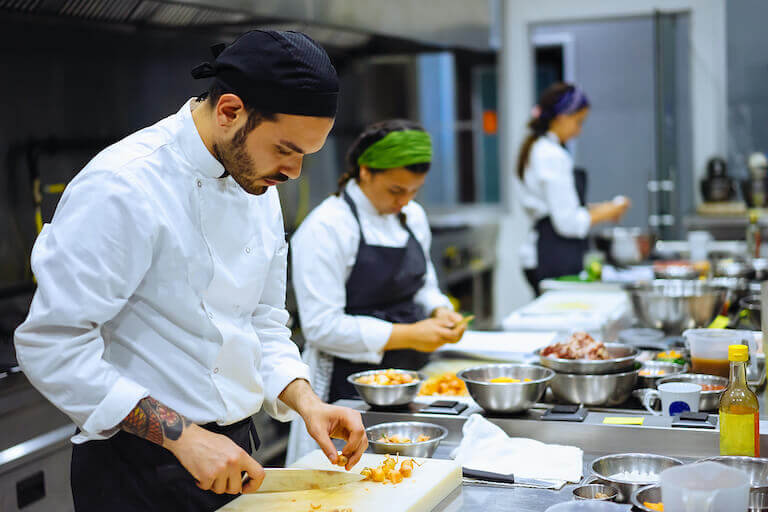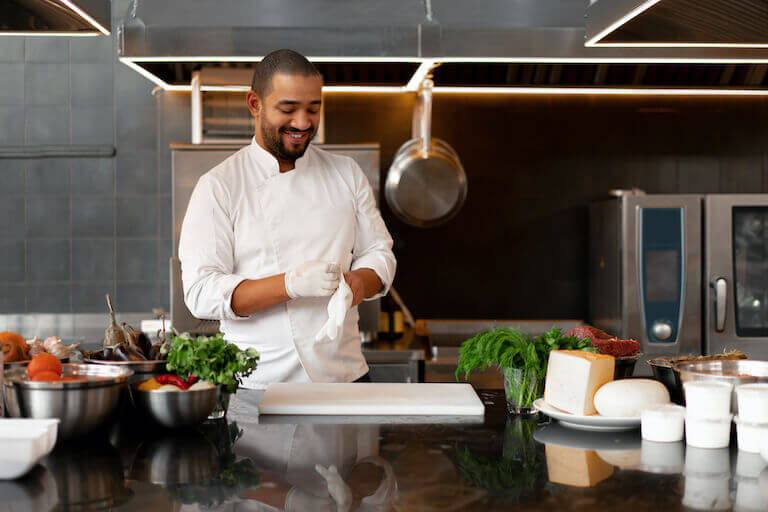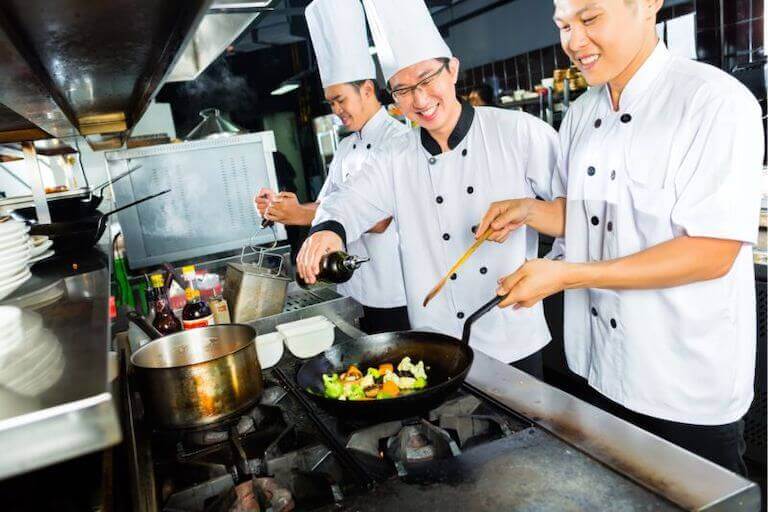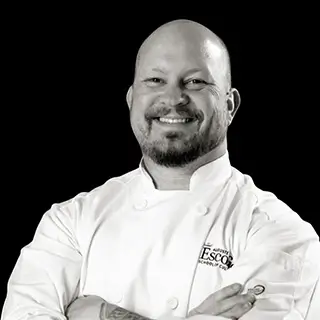Listen to This Article:
Professional kitchens are fast-paced environments, where creativity and precision combine to create memorable dining experiences for guests. While rewarding for chefs, this environment is also known for being one of the most intense and stressful work environments. For new chefs, regardless of their age, getting started in this fast-paced world can be both exhilarating and challenging.
Achieving success in this type of setting requires more than just technical cooking skills. Attitude, behavior, and communication skills are keys to thriving in this demanding setting and becoming an essential part of the team.
To provide you with an insider’s perspective, this article features tips from Escoffier staff and students who’ve experienced these challenges firsthand. These ten insights can help you build the skills, confidence, and mindset needed to excel in the kitchen and stand out as a valuable team member.
1. Come Prepared and Show Up Early
Success in the kitchen starts before the restaurant opens and the rush begins. Arriving early allows you time to get settled, wash up, and prepare your station before your shift begins. Instead of rushing in right when your shift begins, you can take time to mentally prepare for the day ahead.
Not only can arriving early help you calmly start your workday, but showing up early can show others that you’re dedicated to your role. Your actions in this area can show your team that you’re reliable and respect their time, helping build a good rapport.
*Information may not reflect every student’s experience. Results and outcomes may be based on several factors, such as geographical region or previous experience.
To develop this habit, you can start by building a pre-shift routine. Lay your uniform out the night before so you don’t have to scramble in the morning. Once you arrive, check your prep list and review the day’s menu items to help ensure you have what you need on hand. Spend time mentally running through the day to prepare yourself for any obstacles that may arise.
By consistently coming prepared and arriving early, you’ll cultivate a sense of calm and readiness that sets the tone for a productive day in the kitchen.
2. Stay Organized with Mise en Place
Preparation doesn’t end at laying your uniform out at night—it extends into the heart of the kitchen with mise en place. This French culinary concept was developed and implemented by Auguste Escoffier and translates to “everything in its place” and serves as the cornerstone of professional kitchen operations.
Similar to how your pre-work routine sets you up for success, an organized work station helps ensure you’re ready for the fast-paced challenges of the kitchen. Starting your shift by gathering the necessary ingredients and tools allows you to arrange everything within arm’s reach, so you’re prepared for every step of the cooking process.

A clean and organized work station helps keep the kitchen running smoothly.
This kitchen tip ties back to why it’s so important to arrive early at work. By practicing mise en place, you’re not just organizing your tools—you’re also cultivating a focused mindset that prepares you to handle the busiest shifts with confidence. As Tracy DeWitt, Escoffier Chef Instructor and winner of the Food Network Challenge, explains: “I like mise en place. I’m big into preparation. Preparation calms me down because I’m a nervous soul. I get calm when I prepare.”
Practicing mise en place can help you move smoothly through your cooking tasks, reduce stress, and maintain a good kitchen flow. Whether you’re dicing onions, plating a dish, or prepping a full list of ingredients, staying organized can help ensure you’re a step ahead.
3. Respect the Hierarchy and the Team
In a professional kitchen, every position—from dishwasher to executive chef—plays an important role. The kitchen runs like a well oiled machine, and understanding the hierarchy is important to help you fit in and keep the operation running smoothly.
Positions in the Kitchen Brigade
The brigade de cuisine, or kitchen brigade, created by Auguste Escoffier, encompasses more than 25 types of chefs, each with their own important role. The most common include:
- Chef de Cuisine (Executive Chef)
- Sous Chef (Deputy Chef)
- Garde Manger (Pantry Chef)
- Patissier (Pastry Chef)
- Saucier (Sauce Chef)
- Commis Chef (Line Cooks)
- Prep cooks
In addition, it can be helpful to watch the rhythm of those in the kitchen and how they interact with one another. Once you see how the team already flows, you can adapt to their rhythm, helping add to their efficiency and effectiveness. It may feel intimidating at first to learn the structure of the hierarchy and pace of the kitchen, but it can help build camaraderie while earning the respect of others on the team as a young chef.
4. If You Don’t Know, Ask Questions
In the fast-paced environment of the professional kitchen, it’s easy to feel overwhelmed by a new task or unfamiliar term. While you may be tempted to pretend you know what’s going on to avoid looking inexperienced, resist the urge. Instead, embrace the courage to ask questions—it can signal to others that you have an eagerness to learn and are committed to doing things the right way. It may feel inconvenient to ask more experienced chefs questions, but it’s better to seek the knowledge you need and avoid costly mistakes that impact and slow the kitchen down.
Asking specific questions, when necessary, can help others provide you with clear and actionable guidance. Instead of something vague like, “What do I do with this?” ask direct questions such as “How should I cut these vegetables for the soup—julienne or dice?” Taking notes on what you learn can be a valuable habit which can help you retain the information.
Remember that every experienced chef was once starting right where you are now. Most seasoned chefs would prefer for you to ask questions to seek clarity instead of needing to help deal with mistakes made from hesitation or miscommunication. Seeking clarity can help you gain respect from those you work with, showing them you’re ready to learn and dedicated to improvement.
5. Stay Calm and Composed Under Pressure
Professional kitchens are known for being high-pressure environments. The ability to remain calm in the midst of it is an invaluable skill which can help you stay focused and be more productive. It’s a skill that can help you earn respect from your colleagues and leaders.
Keeping your composure can also help you think more clearly, make better decisions, and earn the respect of your colleagues.
Tips to Help Chefs Remain Calm in the Kitchen
- Practice Deep Breathing: When you feel yourself getting anxious, your body may begin shifting into the fight, flight, or freeze response. Deep breathing can help slow your physical response to stress, helping your brain know that you’re safe. This can help you calm down and think more clearly.
- Separate the Professional from the Personal: When you receive feedback, remind yourself that it’s about the task and not you as a person. This can help you focus and learn from the feedback that you’re receiving so you can grow and develop as a chef.
- Visualize the Process: Imagining completing each step in advance can help you move smoothly through the process. It can assist you in calming anxious thoughts and keeping you centered, especially during peak hours.
*Information may not reflect every student’s experience. Results and outcomes may be based on several factors, such as geographical region or previous experience.
Staying calm in the kitchen also means being able to take constructive criticism, even if harsh or abrupt. Instead of reacting defensively, remember that feedback can help you grow as a chef, so challenge yourself to view it as an opportunity for growth and development.
With time and practice, you can learn to stay calm under pressure and thrive in the fast-paced professional kitchen environment.
6. Always Be Cleaning
In a professional kitchen, cleanliness is more than just about efficiency and staying organized—it’s essential for food safety. A clean station reflects your attention to detail and helps ensure a smooth workflow, reducing the risk of accidents and cross-contamination.
Cleaning as you go is an important skill for all chefs to develop. Wiping down surfaces as you cook, cleaning waste, and returning items to where they belong helps minimize clutter and keeps your station functional throughout the shift. Regularly check your station for spills, loose ingredients, and tools that need to be put away to help manage a clean and safe work station.

A clean work station helps chefs work efficiently and safely.
While this may seem like a small habit, it can improve your workflow and prevent accidents, which is critical in a professional kitchen. It can communicate to your team that you take pride in your work and the safety and efficiency of those around you.
By prioritizing cleanliness, you’ll not only make your own tasks easier but also contribute to a safer and more productive kitchen environment. Remember, a well-organized and clean station is a reflection of a well-organized and professional chef.
7. Know How to Manage Your Time
Time management is known for being an essential part of every career and it’s no different in the professional kitchen setting. Each menu item has a specific time requirement and any delays in the process can disrupt the entire kitchen flow. These delays don’t just impact you, but the entire kitchen team as well.
You can begin to build your time management skills by learning how long each task takes you to complete. Then, you can prioritize your tasks based on the timing and cooking process. For example, you might need to start simmering a sauce early while chopping vegetables so everything is ready at the same time.
It can also help you to develop a “mental timer” to keep you on track. Over time, you’ll begin to find a natural rhythm that keeps you aligned with the rest of the team. As you gain experience, you’ll begin to anticipate when certain tasks may take you longer so you can adjust your workflow accordingly.
Good time management skills help keep the kitchen running smoothly. Staying organized and focused can help you show others that you’re a reliable member of the team who can handle high-pressure situations with ease.
8. Communicate Openly and Often
In a professional kitchen, good communication skills are as important as foundation cooking skills like knife techniques. The U.S. Bureau of Labor Statistics lists communication as one of the most important qualities for a chef—for good reason. Alerting others when you’re running behind or need help can prevent small issues from becoming larger problems.
“Communication is very important!” shares Shai Fernandez, Sous Chef at Sheraton Hotels & Resorts and Escoffier graduate. “If you’re behind, you have to let people know. If one station goes down, the whole restaurant is in trouble.”
By checking in regularly, confirming instructions, and updating your status with the team, you can help keep the kitchen running smoothly.
The following tips can help you improve communication:
- Speak Up Early: Let the team know immediately if you’re running behind or need help. This provides others a chance to adjust and help if needed.
- Use Kitchen Lingo: Using simple, direct phrases like “behind” or “coming through” helps keep everyone aware of your movements to avoid accidents.
- Check-In and Confirm Instructions: After receiving an instruction, confirm by saying something like, “Yes, Chef,” to show that you understand. This clarity helps avoid mistakes and reassures the team that you’re on track.
- Offer Updates on Tasks: If a task is taking longer than expected, let others know. Keeping others informed can help coordinate timing and keep the workflow steady across stations.
Effective communication is a team effort that can help foster a supportive and collaborative kitchen environment. Open lines of communication not only contribute to the team’s success but also build trust and respect among your leaders and colleagues.
9. Show Initiative and Anticipate Needs
One of the most valuable traits you can develop in a professional kitchen is being proactive. The ability to anticipate the needs of others and step in to help without being asked can demonstrate your commitment to the team.
Begin by paying attention to the kitchen’s flow. Is a teammate falling behind? Offer to lend a hand. Are supplies running low? Restock them before someone has to ask you. These may be small acts of initiative, but they keep things moving efficiently and show your colleagues and superiors that you’re attentive and dependable.

Young chefs can help the kitchen run smoothly by anticipating the needs and looking for ways to assist others.
Refuse to stand idle during downtime. You can use the slower times as an opportunity to clean, organize, and prepare for the next wave of orders. When you actively look for ways to contribute to the kitchen as a whole—and not just your role and station—you can stand out as someone who adds value to the team.
Taking initiative can help you set yourself apart as a young chef. The ability to anticipate needs and act accordingly is a valuable skill in professional kitchens. You can earn respect, grow your confidence, and set yourself up for long-term success by demonstrating this proactive mindset.
10. Develop a Positive, Professional Attitude
Maintaining a positive attitude in the midst of a fast-paced, high-pressure environment can be a game-changer for your career. Choosing an optimistic attitude can not only make your workday better, but it can also help you be someone that others want to work with.
People are naturally drawn to those who exude positivity and a can-do spirit. When you tackle each day—and its challenges—with a positive mindset, you can show your superiors and colleagues that you’re resilient and adaptable. Not only will this help others enjoy working with you more, it can help improve your experience in the kitchen.
For example, if a station runs out of an ingredient mid-service, rather than panicking or assigning blame, approach the situation with a solution-oriented mindset. Check the pantry for substitutions or collaborate with the prep team to resolve the issue quickly. Responding with calm and positivity can ease tension, keep the kitchen running smoothly, and demonstrate your reliability and composure under pressure.
Choosing to respond positively to difficult situations can help set a more positive tone in the kitchen and foster a positive work culture in the kitchen. By staying focused on solutions instead of problems, and embracing the chance to learn from every experience, you’ll set yourself up for long-term success and build a strong reputation within the industry.
Building a Foundation for Success in the Kitchen
Professional kitchens can feel exciting and challenging simultaneously. Escoffier Culinary Arts Chef Instructor Cesar Herrera understands that feeling and how it can become part of what chefs love about working in the kitchen. “Once you start [working in a professional kitchen], it becomes a part of you,” he says. “You need the adrenaline rush. It’s a different feeling to be behind the line, working as a team and making things happen.”
The tips above can help you as a young chef transition from the overwhelm you may feel when staring out in a professional kitchen to feeling more confident in your role. By embracing preparation, teamwork, and a positive attitude, you can not only survive but thrive in a professional kitchen environment.
If you’re ready to discover the unique energy and teamwork Chef Cesar describes, and take the next step in building a rewarding culinary career, explore Escoffier’s degree and diploma programs in Austin, TX, Boulder, CO, and online. These programs can offer the foundation and skills to turn your passion for cooking into a lifelong profession.
EXPLORE THESE ARTICLES FOR MORE INSIGHTS ON THRIVING IN THE KITCHEN!
- Why Stress Management Is Important for Culinary Students
- How Chefs Can Manage Stress In a Professional Kitchen
- What Skills Do You Need to Become a Chef?
This article was originally published on January 5, 2016 and has since been updated.



